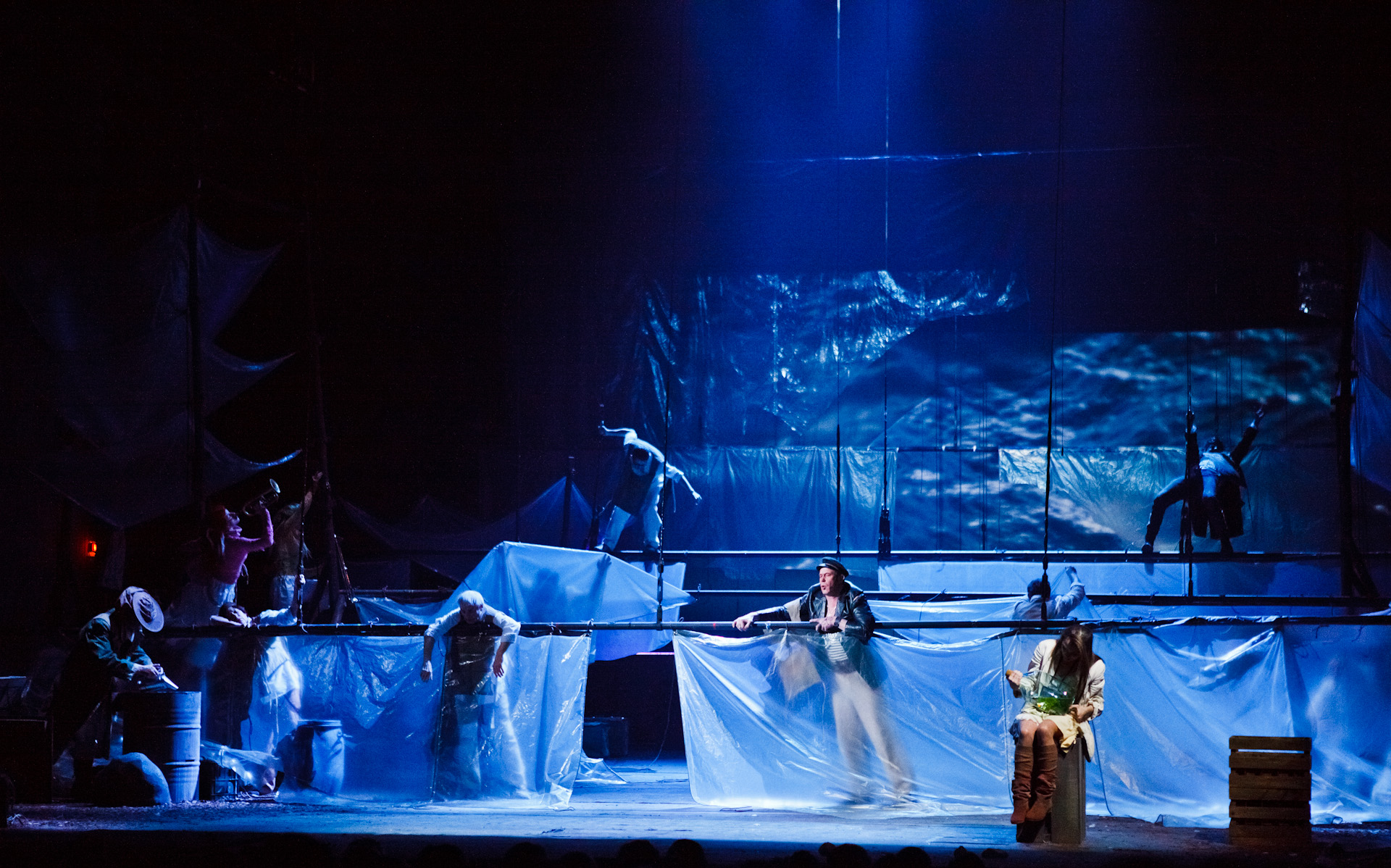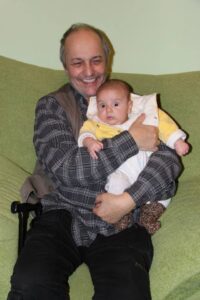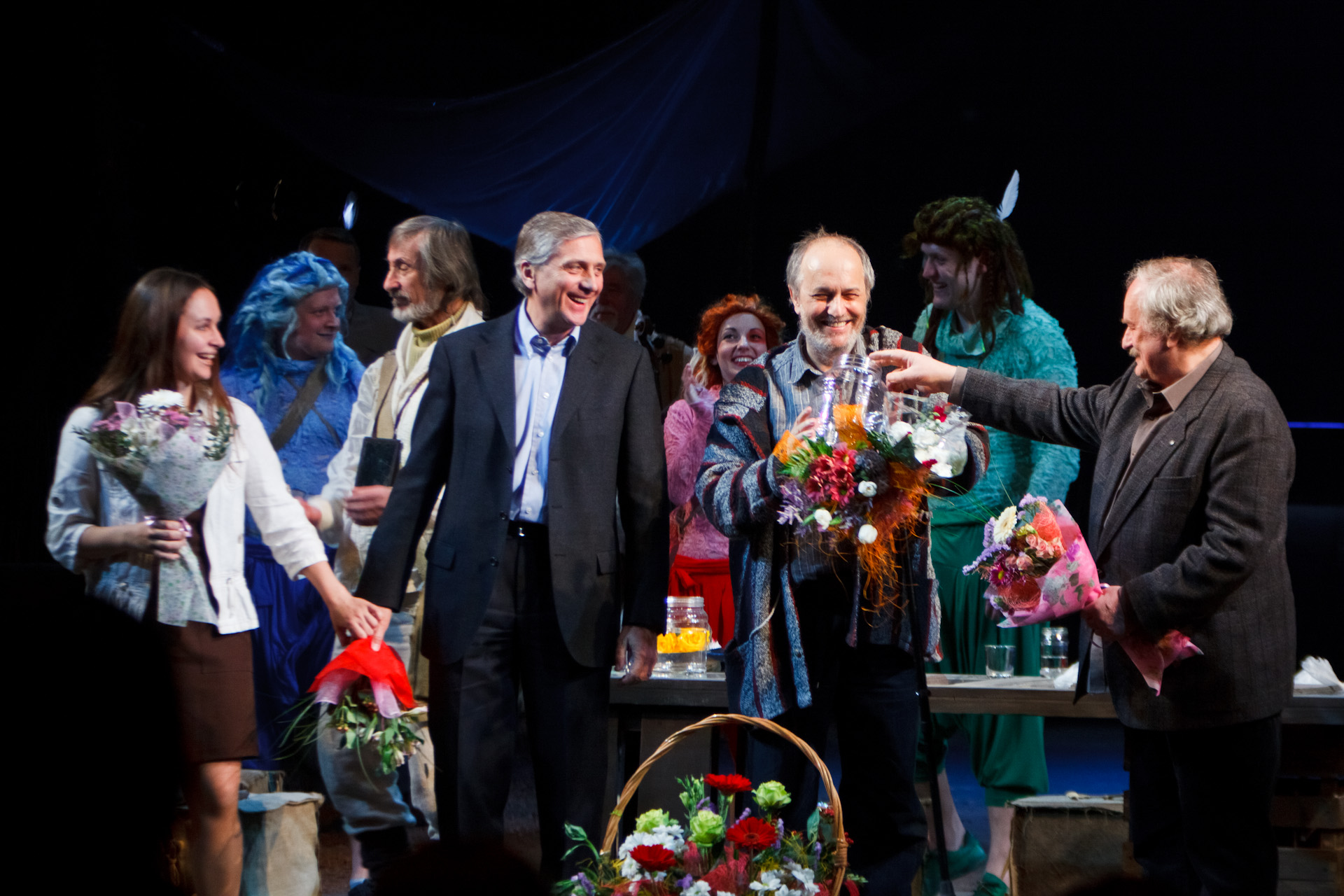Tempest, William Shakespeare
Volkov Theatre, Yaroslavl
Premiere: March 23, 2012
Duration: 2 hours 45 minutes
Director & Lighting Design: Henryk Baranowski (Poland)
Set Designer: Jerzy Kalina (Poland)
Costume Designers: Sofia de Inez, Dorota Morawetz (Poland)
Co-Director: Vladimir Maizinger
Composer: Igor Esipovich
Choreographer: Sergei Gritsai
Video Art, Editing, Filming: Svetlana Bakushina
Translation: Mikhail Donskoy
Assistant Director: Natalia Mundum
New Chapter Begins
Henryk received an invitation from Yaroslavl’s Volkov Theatre to direct Shakespeare’s “The Tempest.” This opportunity meant that both Sergei Gritsay and I were automatically part of the creative team. By this time, I had relocated to Portugal where my second son was born.
Bureaucratic Nightmare
Traveling required ordering passports and arranging visas for both my son and my husband Carlos, who would accompany us. With limited time available—Henryk requested we arrive within 15 days as he was already there rehearsing—we faced significant pressure. Simultaneously, my older son was staying with my mother in Novosibirsk, and we planned to collect him (a four-hour flight away) after completing our work in Yaroslavl.
We secured a passport for the baby and contacted the Russian embassy to confirm we would receive our visas on time, which they verbally assured us. However, the next morning when applying, we encountered the classic “welcome to Soviet Union” situation. The consul informed us we would only receive visas three days after the flight date—contradicting what we’d been told by phone. I was shocked by this reversal, especially since we had already purchased non-refundable tickets at considerable expense.
The consul casually told us we’d only get the visas three days after our flight date. I was speechless—we’d already bought non-refundable tickets at a huge cost. Their attitude was brutal: “Whoever told you that on the phone was wrong. Change your plans.” That the embassy would make no exceptions to their rules. They even charged the full tourist visa fee for my infant son, asking with straight faces about his “purpose of visit”—as if his only agenda wasn’t simply to breastfeed. We left the embassy with both a terrible feeling and the financial blow of losing money on tickets we couldn’t return. It was truly disgusting, but we were powerless against the system.
A Two-Month-Old Goes Professional
So it happened that our two-month-old baby accompanied us. The journey involved two planes and a train from Moscow to Yaroslavl. We arrived on March 8th, International Women’s Day, and Henryk met us at the train station with a beautiful red rose for me.
He looked remarkably happy—smiling and energetic. He confessed he had worried I might never want to work with him again after the “Loneliness in the Net” production. I noticed he had acquired a new accessory: a walking stick, the result of another back surgery that made walking easier for him.
Our Yaroslavl Home Base
The theatre had arranged comfortable accommodation for us—a beautiful apartment with elegant decoration and all new furniture. After settling in, we attended a meeting with theatre director Yuri Itin, where I also met two more wonderful people: costume designer Dorota Morawetz and production designer Jerzy Kalina.
rehearsals
The Working Setup
I was well prepared with portions of my work already completed, allowing me to focus on video projection art from my office while Henryk rehearsed with actors at the theatre. He occupied another apartment in a neighboring building. He consistently employed someone, typically a woman, to privately handle his grocery shopping and cooking as he lacked time for such tasks. He recommended we arrange similar assistance.
Opening presentation and exhibition
The evening before the premiere at the theater hall featured a presentation of The Tempest project, along with a themed exhibition of art objects and installations by Jerzy Kalina
Balancing Parenthood and Production
The baby accompanied me to several rehearsals initially, creating quite an unusual scene. During one particular instance, my husband watched him while I worked. Upon returning a couple hours later, I found my husband completely exhausted and distressed from the baby’s relentless crying. He had attempted everything to soothe him without success. What the baby truly wanted was the comfort and nourishment only a mother’s breast could provide. This arrangement clearly couldn’t continue, so we promptly hired a nanny. Alex bonded with her immediately.
Lullabies and Godfather Duties
Henryk visited every evening to see the baby, enjoying holding him in his arms. One particularly touching moment occurred when he spent nearly half an hour singing Polish lullabies to him—a surprisingly sweet interaction to witness. We collectively decided Henryk would become Alex’s godfather, and planned to baptize him. I asked Henryk about his feelings, as a Catholic, regarding an Orthodox church ceremony. He responded thoughtfully that “God is God” and religious distinctions didn’t concern him. Though we found a church for the baptism, the priest declined to perform winter ceremonies for infants, fearing they might fall ill in the cold building. Nevertheless, the “godfather” title remained permanently with Henryk.
Back to Work
Jerzy Kalina was always angry and upset. He gave orders to the stage workers — where to put things, what to move — and they tried their best to follow, but most of the time they couldn’t understand what he was saying. Jerzy, seeing that someone wasn’t doing what he had asked, would get even more upset and definitely say a few bad words. But still, no one could really figure out what he was demanding. It was a language problem. All the stage workers were afraid of him. I understand — they had to guess what he wanted, and if they guessed wrong, Jerzy would get very angry and yell at them.
Working with Jerzy
Personally, I actually enjoyed working with Jerzy. He is a great artist, and I learned a lot from him. We worked very closely together. He was there with his wonderful wife, who helped a lot — she spoke very good Russian and could explain what Jerzy meant. She even offered me a sandwich with Polish sausage that she had brought from home.
A Small Incident
Overall, the project was going well and without accidents. The only time something serious happened was when Henryk felt really bad — the ambulance came, and it turned out his blood sugar was extremely low. Luckily, it was quickly treated, and by the evening he was already feeling good.
Finishing the Work
The work was finished. Henryk and our team went home, but my mission was still not accomplished. We had to film a commercial for one of our clients, and we were counting on actors from the Yaroslavl Theatre. We also needed a general’s suit, which Henryk kindly helped us find through a friend. After that, I had to rush to the airport to catch a flight to Novosibirsk and pick up my older son. Carlos had to stay in a hotel with the baby for one day and night — the whole operation, from beginning to end, was extremely stressful, at least for me. But finally, the family was reunited.
Another Challenge: Getting the Visa
Next, we had to face a new adventure — getting a visa for my son, who was a Russian citizen. The trip from the hotel to the Portuguese embassy took almost three hours. There were no street signs, and despite asking people on the street, no one knew where it was. After a lot of walking, we finally realized we were already on the right street. We entered the embassy about an hour after it had closed for visitors, but they let us in.
We explained the situation and the consul interviewed my son, asking tricky questions like whether he knew where he was going and if he wanted to go with us. Luckily, he answered yes, saying he wanted to go because he liked swimming in the ocean.
They asked us to wait a few hours, so we went to an Irish restaurant and ordered big steaks — we were really hungry.
When we returned, they handed us the passport with the visa. We wanted to pay, but the consul told us that, under an agreement between Portugal and Russia, minors’ visas were free. Carlos was surprised and joked that it was the first time we got anything for free in Russia. The consul smiled and said, “Here, you are not in Russia.”
A New Invitation
A few months later, Henryk called to invite me to his next project — Donizetti’s The Elixir of Love at Opera Krakowska in Krakow. As always, he gathered his loyal team: Dorota Morawetz, Paweł Dobrzycki, and conductor Evgeny Volynskiy, who had moved to Poland after the success of Life with an Idiot in 2003, also directed by Henryk.
Henryk wanted me to come and create video projections again. Unfortunately, with two kids, it was impossible. We tried to find solutions — Henryk even found a Russian school for my older son — but in the end, it just wasn’t feasible. Under different circumstances, I wouldn’t have hesitated for a second.
The premiere took place on December 2, 2012. I called to congratulate him — it was another success, as always. Interestingly, this time Henryk didn’t use any video projections at all.
A collection of video art stage projections
Some of the visuals I created for the stage screen projections.








